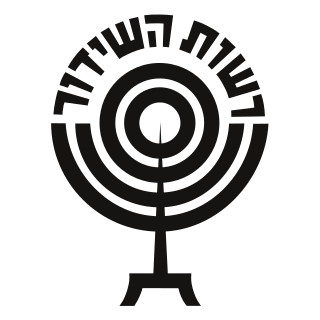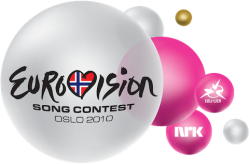
The Israel Broadcasting Authority was Israel's public broadcaster from 1948 to 2017.

Israel has participated in the Eurovision Song Contest 45 times since making its debut in 1973. Israel was able to enter the contest as the Israel Broadcasting Authority (IBA) was an active member of the European Broadcasting Union (EBU), which was responsible for the event. The IBA was succeeded as the broadcaster in charge of the Israeli entry by the Israeli Public Broadcasting Corporation (IPBC/Kan) in 2018. Israel has won the contest four times, and has hosted the contest in Jerusalem twice in 1979 and 1999. Israel hosted the contest for the third time in Tel Aviv in 2019.

Lebanon has never participated in the Eurovision Song Contest. The country's broadcasting organisation, Télé Liban, was set to make the country's debut at the Eurovision Song Contest 2005 with the song "Quand tout s'enfuit" performed by Aline Lahoud, but withdrew due to Lebanon's laws barring the broadcast of Israeli content.

The Eurovision Song Contest 2009 was the 54th edition of the Eurovision Song Contest. It took place in Moscow, Russia, following the country's victory at the 2008 contest with the song "Believe" by Dima Bilan. Organised by the European Broadcasting Union (EBU) and host broadcaster Channel One (C1R), the contest was held at the Olimpiysky Arena, and consisted of two semi-finals on 12 and 14 May, and a final on 16 May 2009. The semi-finals were presented by Russian model Natalia Vodianova and television presenter Andrey Malakhov, while the final was presented by Russian television presenter Ivan Urgant and former Russian contestant Alsou Abramova, becoming the first and to date only time that two different sets of presenters had hosted the semi-finals and finals.
Israel participated in the Eurovision Song Contest 2009 with the song "There Must Be Another Way" written by Noa, Mira Awad and Gil Dor. The song was performed by Noa and Mira Awad, who were internally selected by the Israeli broadcaster Israel Broadcasting Authority (IBA) in January 2009 to compete at the 2009 contest in Moscow, Russia. The song Noa and Awad would perform at Eurovision was selected through the national final Kdam Eurovision 2009 which took place on 2 March 2009 that featured four songs. "Einaiych " emerged as the winning song after achieving the highest score following the combination of votes from two regional juries, a jury panel and a public vote.

The Eurovision Song Contest 2010 was the 55th edition of the Eurovision Song Contest. It took place in Oslo, Norway, following the country's victory at the 2009 contest with the song "Fairytale" by Alexander Rybak. Organised by the European Broadcasting Union (EBU) and host broadcaster Norsk rikskringkasting (NRK), the contest was held at the Telenor Arena, and consisted of two semi-finals on 25 and 27 May, and a final on 29 May 2010, tying with the 1999 edition for the contest hosted the latest. The three live shows were presented by Norwegian television presenters Erik Solbakken and Nadia Hasnaoui and singer Haddy N'jie.
Israel participated in the Eurovision Song Contest 2010 with the song "Milim" written by Tomer Hadadi and Noam Horev. The song was performed by Harel Skaat, who was internally selected by the Israeli broadcaster Israel Broadcasting Authority (IBA) in collaboration with the commercial broadcaster Reshet in December 2009 to compete at the 2010 contest in Oslo, Norway. The song Skaat would perform at Eurovision was selected through the national final Kdam Eurovision 2010 which took place on 15 March 2010 that featured four songs. "Milim" emerged as the winning song after achieving the highest score following the combination of votes from four thematical jury groups, a jury panel and a public vote.
Israel participated in the Eurovision Song Contest 2011 with the song "Ding Dong" written and performed by Dana International, who had previously represented Israel in the Eurovision Song Contest in 1998 where she won the contest with the song "Diva". The Israeli entry for the 2011 contest in Düsseldorf, Germany was selected through the national final Kdam Eurovision 2011, organised by the Israeli broadcaster Israel Broadcasting Authority (IBA). The competition took place on 8 March 2011 that featured ten entries. "Ding Dong" performed by Dana International emerged as the winner after achieving the highest score following the combination of votes from three thematical jury groups, a twelve-member jury panel and a public vote.
Israel participated in the Eurovision Song Contest 2004 with the song "Leha'amin" written by David D'Or, Ofer Meiri and Ehud Manor. The song was performed by David D'Or, who was internally selected by the Israeli broadcaster Israel Broadcasting Authority (IBA) to compete at the 2004 contest in Istanbul, Turkey. The song D'Or would perform at Eurovision was selected through the national final Kdam Eurovision 2004 that took place on 5 February 2004 and featured four songs. "Leha'amin" emerged as the winning song after gaining the most points following the combination of a jury vote, an audience vote and a public televote.
Israel participated in the Eurovision Song Contest 2012 with the song "Time" written by Ran Shem-Tov and Shiri Hadar. The song was performed by the band Izabo, which was internally selected by the Israeli broadcaster Israel Broadcasting Authority (IBA) to compete at the 2012 contest in Baku, Azerbaijan. Izabo and the song "Time" were announced as the Israeli entry on 7 February 2012. The song was presented to the public on 1 March 2012.
Israel participated in the Eurovision Song Contest 2013 with the song "Rak Bishvilo" written by Chen Harari and Gal Sarig. The song was performed by Moran Mazor. The Israeli entry for the 2013 contest in Malmö, Sweden was selected through the national final Kdam Eurovision 2013, organised by the Israeli broadcaster Israel Broadcasting Authority (IBA). The five show competition consisting of three semi-finals and a Second Chance round concluded with a final on 7 March 2013 that featured ten entries. "Rak Bishvilo" performed by Moran Mazor emerged as the winner after achieving the highest score following the combination of votes from a seven-member jury panel and a public vote.
Israel participated in the Eurovision Song Contest 2014 with the song "Same Heart" written by Rami Talmid. The song was performed by Mei Finegold, who was internally selected by the Israeli broadcaster Israel Broadcasting Authority (IBA) to compete at the 2014 contest in Copenhagen, Denmark. The song Finegold would perform at Eurovision was selected through the national final Kdam Eurovision 2014 that featured three songs submitted by the public and Finegold herself, which were presented to the public via the release of their official music videos during a show on 27 February 2014. "Same Heart" emerged as the winning song on 5 March 2014 after gaining 55% of the public vote.
Israel participated in the Eurovision Song Contest 2015 with the song "Golden Boy", written by Doron Madali. The song was performed by Nadav Guedj. Israeli broadcaster Israel Broadcasting Authority (IBA) collaborated with the commercial broadcaster Keshet in order to select the Israeli entry for the 2015 contest in Vienna, Austria. The reality singing competition HaKokhav HaBa, which was organised by Keshet, was used to select the artist that would represent Israel. Nadav Guedj emerged as the winner of the competition in a final that took place in February 2015. The song "Golden Boy" was later internally selected as the song Guedj would perform at Eurovision and was presented to the public in March 2015.
Israel participated in the Eurovision Song Contest 2016 with the song "Made of Stars" written by Doron Medalie. The song was performed by Hovi Star. Israeli broadcaster Israel Broadcasting Authority (IBA) collaborated with the commercial broadcaster Keshet in order to select the Israeli entry for the 2016 contest in Stockholm, Sweden. The reality singing competition HaKokhav HaBa L'Eirovizion, which was organised by Keshet and Tedy Productions, was used to select the Israeli entry. The fifteen show competition concluded with a final on 3 March 2016 that featured four performers who were matched with potential Eurovision songs. "Made of Stars" performed by Hovi Star emerged as the winner following a public vote.

The Eurovision Song Contest 2017 was the 62nd edition of the Eurovision Song Contest. It took place in Kyiv, Ukraine, following the country's victory at the 2016 contest with the song "1944" by Jamala. Organised by the European Broadcasting Union (EBU) and host broadcaster Public Broadcasting Company of Ukraine (UA:PBC), the contest was held at the International Exhibition Centre and consisted of two semi-finals on 9 and 11 May, and a final on 13 May 2017. The three live shows were presented by Ukrainian television presenters Oleksandr Skichko, Volodymyr Ostapchuk and Timur Miroshnychenko, being the first contest since the inaugural 1956 edition without a female host.
Israel participated in the Eurovision Song Contest 2017. Israeli broadcaster Israel Broadcasting Authority (IBA) collaborated with the commercial broadcaster Keshet and Tedy Productions which organised the reality singing competition HaKokhav HaBa L'Eurovizion to select the singer. The winner of the Israeli national selection was Imri Ziv and a committee of the Israeli broadcaster internally selected for him the song "I Feel Alive" written by Dolev Ram and Penn Hazut. The song was presented to the public on 13 March 2017.
Israel participated in the Eurovision Song Contest 2002 with the song "Light a Candle" written by Svika Pick and Yoav Ginai. The song was performed by Sarit Hadad, who was internally selected by the Israeli broadcaster Israel Broadcasting Authority (IBA) in November 2001 to compete at the 2002 contest in Tallinn, Estonia. The song Hadad would perform at Eurovision, "Light a Candle", was also internally selected and presented to the public on 26 February 2002 during the Meni Peer Show which was broadcast on Channel 1.
Israel entered the Eurovision Song Contest 1995 with the song "Amen" by Liora after she won the Israeli national final.

The Eurovision Song Contest has had a long-held fan base in the LGBTQIA+ community, and Eurovision organisers have actively worked to include these fans in the contest since the 1990s.







